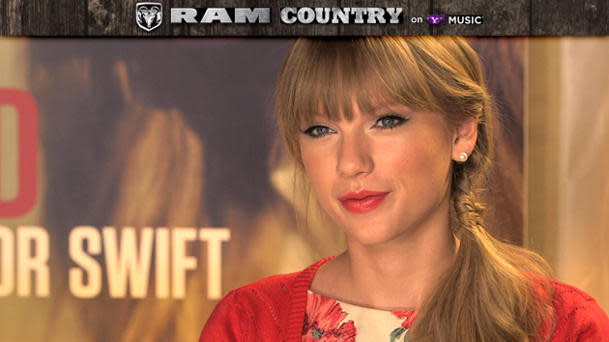Exclusive: Taylor Swift On ‘Growing Up’ From ‘Treacherous’ Bad Boys to Beginning Again With Good Guys

In the conclusion of Yahoo! Music's interview with Taylor Swift, we query the singer about her beguiling new single "Begin Again"—and how that contrasts with some earlier songs that were more about rough landings than sweet beginnings. Has she really gotten over her attraction to the "Treacherous" type? We'll let her explain.
YAHOO! MUSIC: "Begin Again" strikes me as being kind of the opposite of "The Way I Loved You," from the Fearless album.Then, you were contrasting the good guy you were with in the song with a less polite guy you were with before—and thinking about how you liked the bad guy better. "Begin Again" is looking back at the bad boy and thinking how you like the new, nice guy better.
SWIFT: That's an awesome, awesome observation. That's a really cool observation. I think that might be kind of growing up. When you think about the song on Fearless, "The Way I Loved You," you're reminiscing about the passion and the heated arguments and the dysfunction of a dysfunctional relationship, and you're fantasizing about it—and maybe you're seeing it with sort of a soundtrack behind it in your memory. You know, I think as you grow up, you start to realize that bad guys are really bad. They just are. They actually are! There's like a .0002% chance that you'll be the exception in changing them. I think that for "Begin Again," it was really an interesting revelation to want the good, and to know that you're moving towards something good, and to feel good about that.
YAHOO! MUSIC: But of course earlier on the new album you do have a song like "Treacherous." That song reminds me a little of Sheryl Crow's "My Favorite Mistake"...
SWIFT: Oh, cool.
YAHOO!: ...when you're cataloguing all the reasons it isn't right and then adding, "I like it." So you're definitely exploring all the different kinds of relationships, including the ones that, unlike "Begin Again" or "Everything Has Changed," are not so promising.
SWIFT: Oh yeah, for sure. With "Treacherous," when I got the idea for the chorus of that song, I immediately called up Dan Wilson and tried to book a writing session with him. When we got in the studio, I played him what I had, and he loved it. And we decided to take the last part of the song to this really kind of chorus-like bridge. I like that when you can make a bridge into something that is chorus-like. And I think that for me, one of my favorite lines of that song is "Nothing safe is worth the drive." And I think it kind of defines why that song was written. Because I tend to feel like when you're looking back on the things that have hurt you in life, I look back on them and think if it made you feel something, it was worth it.
YAHOO!: You picked some really estimable people to work with, from Butch Walker to Max Martin to Dan Wilson. Even though these people seemingly don't belong on the same record, I was glad to see all these names coming up. Did Butch Walker come about as a result of him covering "You Belong With Me" and a friendship developing out of that?
SWIFT: I have always been a huge fan of Butch Walker. Because we went to go see him in concert maybe two years ago; we saw him play at a club. And he has such amazing charisma and control over the audience. I was also just fascinated by him as a musician, as an artist, as a producer. And so I worked on a few songs with him, and the one that ended up making the record was when I wrote the song with Ed Sheeran, "Everything Has Changed." I said, "I think I know somebody who would be perfect for this." And Butch was perfect for it.
YAHOO!: Of course, there are so many collaborations on this album—songwriting, production, duets. It seems like Speak Now was, in its way, kind of a pure singer/songwriter album, or your version of one, even though it was not the folky thing people associate with that term. On this one, you didn't want to be precious in any way about holding everything for yourself. But obviously you still want it to be full of personal statements. So how did you feel about shifting toward something so mutli-collaborative? I think I even read something where you said you were giving up the music in some cases to just focus on the lyrics.
SWIFT: No, that never happened. No, because everything we used for the record, the co-writes, were ideas that I brought in—melodies and choruses. What I loved about the collaborative process was, I would go in, play them the idea that I wanted to write, tell them exactly the situation that happened around it… I like everybody to be on the same page. So I literally will go in and be like, "I know I just met you, but I need to tell you what I'm dealing with right now. Okay? So I met this guy, and bla-bla-bla-bla-bla. And here we are six months later, and bla-bla-bla-bla-bla. And I don't know if I should call him back, I don't know what to do about that—bla-bla-bla-bla-bla." So, completely catch them up on the dramatic situation I'm going through, and then I play them the idea that I have about it, and then we kind of roll with it. There were songs that started from a melody that someone else brought, or a track or something—but none of that made the record.
For more on the song "Begin Again," and "rebirth in that whole horrible crash-and-burn end of a relationship," check out part 1 of our conversation with Swift here.
